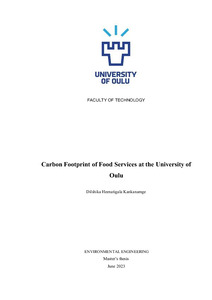Carbon footprint of food services at the University of Oulu
Heenatigala Kankanamge, Dilshika (2023-06-20)
Heenatigala Kankanamge, Dilshika
D. Heenatigala Kankanamge
20.06.2023
© 2023 Dilshika Heenatigala Kankanamge. Tämä Kohde on tekijänoikeuden ja/tai lähioikeuksien suojaama. Voit käyttää Kohdetta käyttöösi sovellettavan tekijänoikeutta ja lähioikeuksia koskevan lainsäädännön sallimilla tavoilla. Muunlaista käyttöä varten tarvitset oikeudenhaltijoiden luvan.
Julkaisun pysyvä osoite on
https://urn.fi/URN:NBN:fi:oulu-202306202672
https://urn.fi/URN:NBN:fi:oulu-202306202672
Tiivistelmä
This thesis examines the impacts of food on biodiversity and quantifies the carbon footprint of food services at the University of Oulu. It aims to provide recommendations for reducing the carbon footprint of food services and minimizing the impacts on biodiversity. The motivation for the study is that reducing the carbon footprint and biodiversity impacts of food services are necessary to achieve carbon neutrality and sustainability goals.
The carbon footprint of food services at the University of Oulu was calculated as 770tCO2eq for the year 2022. Food categories identified as top contributors to carbon footprint and biodiversity impacts are meat and dairy milk products; therefore, their consumption should be reduced.
To reduce carbon footprint, five scenarios were considered, each offering potential solutions. The most effective scenario involves substituting all meat and milk consumption with plant-based alternatives, resulting in a 50% reduction in the carbon footprint. Another scenario focuses on substituting 60% of meat consumption with low-carbon footprint fish, broiler, and plant-based products, leading to a 22% reduction in the carbon footprint. It is important to systematically address the substitution of high-carbon footprint food items with low-carbon footprint alternatives, in order to achieve carbon neutrality objectives.
To motivate sustainable and low-carbon footprint food choices, substituting plant-based alternatives and diversifying recipes while maintaining the sensory pleasure of meals is crucial. Offering a number of vegetarian or vegan meals, price rewards, and supporting environmentally conscious suppliers are effective strategies. Good communication with restaurant providers and customers is also essential, including sharing research findings, utilizing customer feedback, and implementing innovative recipes and meal plans. Balancing customer satisfaction with climate mitigation and sustainability goals is a top priority for restaurants.
Several limitations regarding the data uniformity and reliability have been identified in the study. Suggestions and recommendations were provided for successful future work and other related research studies.
The carbon footprint of food services at the University of Oulu was calculated as 770tCO2eq for the year 2022. Food categories identified as top contributors to carbon footprint and biodiversity impacts are meat and dairy milk products; therefore, their consumption should be reduced.
To reduce carbon footprint, five scenarios were considered, each offering potential solutions. The most effective scenario involves substituting all meat and milk consumption with plant-based alternatives, resulting in a 50% reduction in the carbon footprint. Another scenario focuses on substituting 60% of meat consumption with low-carbon footprint fish, broiler, and plant-based products, leading to a 22% reduction in the carbon footprint. It is important to systematically address the substitution of high-carbon footprint food items with low-carbon footprint alternatives, in order to achieve carbon neutrality objectives.
To motivate sustainable and low-carbon footprint food choices, substituting plant-based alternatives and diversifying recipes while maintaining the sensory pleasure of meals is crucial. Offering a number of vegetarian or vegan meals, price rewards, and supporting environmentally conscious suppliers are effective strategies. Good communication with restaurant providers and customers is also essential, including sharing research findings, utilizing customer feedback, and implementing innovative recipes and meal plans. Balancing customer satisfaction with climate mitigation and sustainability goals is a top priority for restaurants.
Several limitations regarding the data uniformity and reliability have been identified in the study. Suggestions and recommendations were provided for successful future work and other related research studies.
Kokoelmat
- Avoin saatavuus [32150]
